With their dazzling colors and elegant fins, Betta fish might just be the aquarium world’s divas. But don’t let their glamorous looks fool you – these guys have a feisty side too! Nicknamed the Siamese Fighting Fish, Bettas are famous for not playing well with others, often leading to some fin-flapping drama that can be a real headache for both the fish and their human fans.
Curious about why these aquatic beauties have such a punchy attitude and what you can do to keep the peace in your tank? Stick around! We’re about to dive into the nitty-gritty of Betta behavior, uncovering why these fish sometimes turn their tails to tussles and how you can create a serene swim space for these flashy swimmers.
Contents
What happens if two betta fish get into a fight?
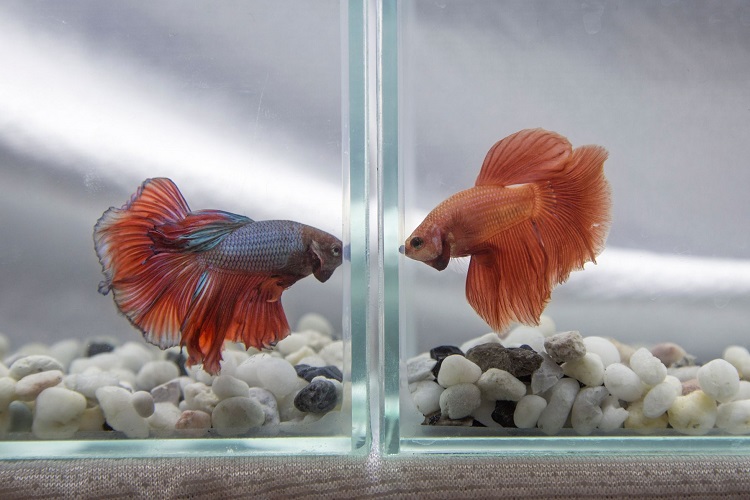
If all Betta fish are anything like the ones we’ve seen, it’s safe to say they’re not friendly. Male Bettas and female Bettas engage in various aggressive behaviors, including fighting with one other and even with other Bettas of the same gender.
It’s a standard practice among pet fish breeders and traders to separate the males from the females in an aquarium. Because Betta fish fights can be brutal, we strongly recommend following that standard practice and keeping two Betta males apart.
When a Betta fish prepares for an attack, it will flare its gills to come forward to appear larger to the enemy, much like any other animal does when it wants to boost its power. Many land species, including pufferfish, employ the same protection technique. The kingdom Animalia fight manual lists scaring their opponent as its number one method.
Nipping, in which competitors circle and nip at the fins of one another, is the next step. As a result of these maneuvers, one or both fish may be harmed, deciding the fight’s outcome. For the most part, the duration of these confrontations is just a few seconds. However, it’s best to avoid them as much as possible.
It has now been established that Bettas fight frequently, and we better understand how they do it. What’s more, do we know why?
Why do Betta fish engage in fighting with one another?
Many factors can lead to a fight between two Betta fish in your aquarium. Territories, food, and female fish are some. Let’s go through them.
Bettas have a strong territorial instinct
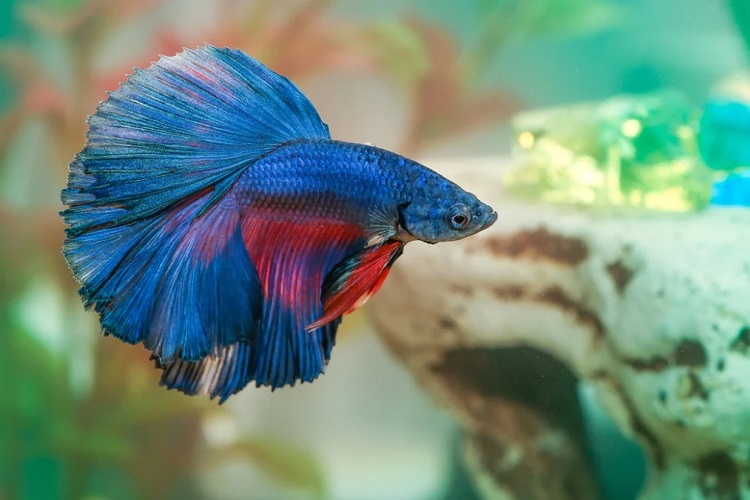
We’ve all heard stories of wild creatures, such as tigers and lions, being passionately territorial. It might seem a little out of place for fish to elicit these feelings, but Betta fish are notoriously possessive of their habitats and may attack a male who enters their domain.
Domestication of these Siamese fishes is rare. They can bring their wild traits home and claim the aquarium as their own. Bettas can live in a variety of aquariums and water environments. They are, however, easily frightened.
In Thailand, for instance, Betta fish are raised in solitary captivity to participate in boxing contests. Individually-raised Bettas are known to battle harder and longer than those bred in groups, and they are more profitable for their keepers. Isolation is terrible and will only lead to aggression and deathly fights.
Bettas frequently engage in food fights
Bettas hunt for food in their natural environments because it’s a rare resource. As a result, many captivity-bred Betta fish exhibit negative attitudes toward the food they eat and become extremely vigilant in protecting their food supply.
As they get older, Bettas develop a solid attachment to the stuff they’re eating. As soon as a male Betta fish senses danger, it’s ready to fight back. Because of their problems in their native habitats, their aggressiveness is not surprising to anyone.
Bettas are pretty good at spotting danger. They won’t waste time and energy battling other fish that aren’t bothering them. They will, however, respond to another Betta male’s presence or other similar-looking species. Keeping male Bettas in different aquariums is the most typical solution to this problem.
Betta males are very possessive about females
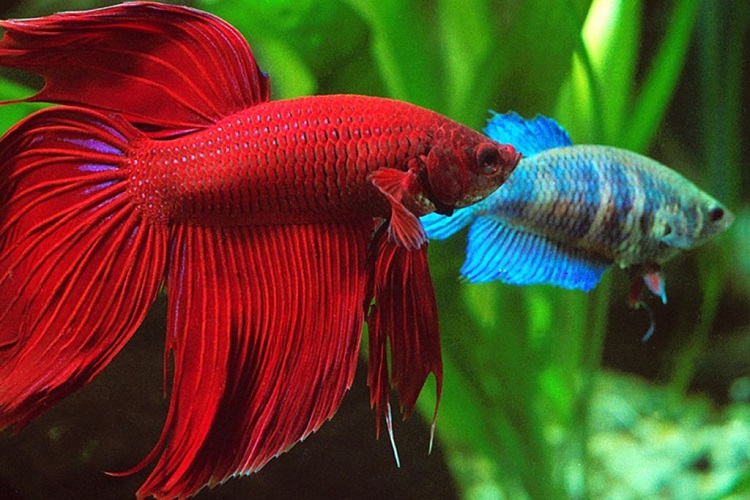
As a whole, betta fish are considered to be aggressive. They engage in sexually-motivated behaviors to attract female members of their species. Female Bettas are distinct from their male counterparts because they have a different sex life cycle. They are docile and can live together in a ‘harem’ in a single tank.
On the other hand, males are known to construct elaborate bubble nests for the eggs laid by their significant females. They’ve even been known to use the nests they’ve built to lure females. They are fiercely protective of their eggs and nests, and other males may even challenge them to reduce their chances of a successful breeding season.
Betta males can exhibit signs of stress
The behavior of a Beta fish can be significantly influenced by the water conditions. Changing their environment in any way can cause Bettas to feel anxious and unsure of their surroundings, leading to stress and, consequently, aggressive behavior.
Bettas do not take kindly to being intimidated
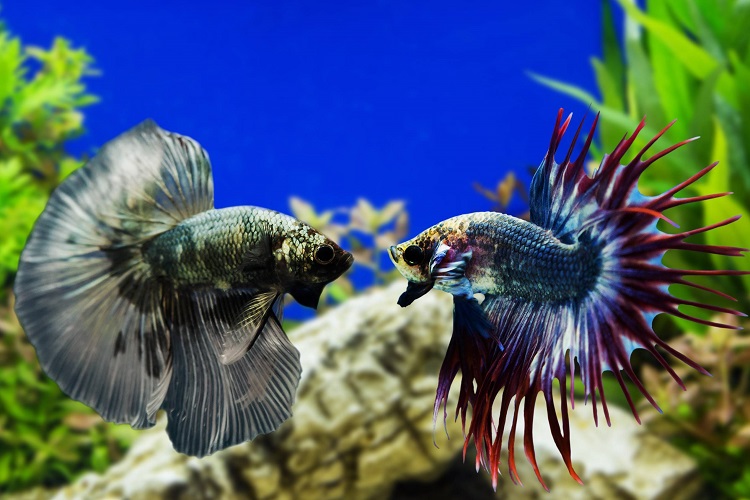
Betta males, as previously stated, may become alarmed if they notice an increase in the number of other Betta males in their immediate surroundings. Siamese have a natural ability to be quickly recognized because of their vibrant colors and tints. Betta males might become frightened and even fight when exposed to brightly colored objects. Bigger fins or longer tails may also make them feel the same way.
How can I prevent Betta fish from fighting?
Bringing up a Siamese Fighting fish is not a task for the faint of heart. Since these fish are so valuable, losing them isn’t ideal, especially if they’ve been pets. The good news is that keeping your fish tank peaceful isn’t as difficult as it seems.
- The first step is to limit the amount of intimidation the male Betta fish face by only allowing one in each tank at a time. When a barrier separates two male fish tanks, there is less chance of one fish reacting to another male in the neighboring tank.
- Avoid mirrors and other shiny objects in the tank. Items like these in a tank can make it look more attractive to humans, but they can also cause stress in fish. Bettas can injure themselves if they attack the ornaments, toys, and other items around the tank.
Researchers gave betta males marijuana and Prozac to curb their hostility. While the fish reacted well to both drugs, they developed a tolerance for marijuana.
We’ll have a better notion of what else we can do to calm the Siamese Fighting fish if we conduct more thorough research. Before administering any medication to your fishy companions via microdosing, it is recommended that you speak with your veterinarian.
Closing Thoughts
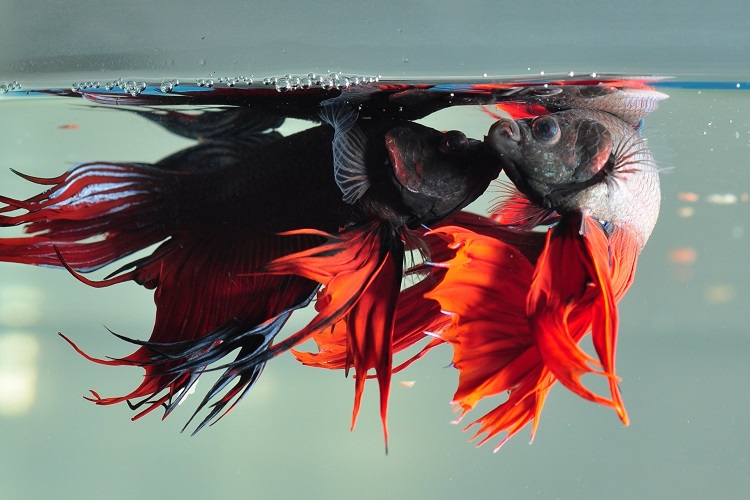
We talked about Betta fish being territorial and possessive of their food supply. The fish also have difficulty adapting fast in the presence of environmental stressors like changes in water quality and alterations in tank design.
Are you still considering getting Bettas as pets or adding another Betta to your tank? Then we recommend consulting with a professional first. The presence of another male in the tank might also make males feel threatened. As a result, avoiding such situations is the wisest course of action.
Lastly, remember to familiarize yourself with the species, their wants, needs, and personalities before deciding.
Let us know if these pointers helped you. And don’t forget to look around the rest of the site! If you enjoyed reading this, explore the rest of the site! Let us know in the comments if you have any further queries!
FAQ: Getting to Know Your Betta’s Battling Ways
1. Why do Betta fish fight each other? Betta fish, especially males, have a strong territorial instinct that drives them to defend their space fiercely.
This instinct is not just about defending a physical location; it’s also about securing food resources and proving dominance over potential mates. In the wild, their aggressive behavior ensures survival, but in the confines of an aquarium, it can lead to serious conflicts with other fish, including their own kind.
Understanding this natural behavior is crucial for creating a peaceful habitat for these vibrant creatures.
2. Can female Betta fish live together without fighting?
Yes, female Betta fish, known for their relatively docile nature compared to males, can coexist peacefully in what’s commonly referred to as a Betta sorority.
However, establishing a harmonious group requires careful planning and monitoring. A spacious tank with plenty of hiding spots and plants can help reduce stress and territorial disputes among the females.
It’s important to introduce them to the tank simultaneously and keep an eye out for any signs of aggression to ensure a serene living environment for your finned friends.
3. How can I prevent my Betta fish from fighting?
Preventing Betta fish from engaging in fights involves minimizing stressors and avoiding situations that trigger their territorial instincts. Keeping male Bettas in separate tanks is a must to prevent direct confrontations.
For those who want to include decorations, opt for less reflective items and provide ample hiding places to reduce stress.
Interestingly, researchers have experimented with non-traditional methods like administering marijuana and Prozac to curb aggression, though these are not standard practices and should only be considered after consulting with a veterinarian.
Remember, understanding and respecting your Betta’s needs and natural behaviors is key to fostering a peaceful aquarium life.

Ian Sterling, founder of Fishlab.com, began his aquarium journey over 30 years ago, driven by a deep fascination for fish and their diverse personalities. His website, Fishlab.com, is dedicated to making fishkeeping accessible and enjoyable, offering beginner-friendly guidance, expert insights, and a community for aquarists to connect and share experiences.


